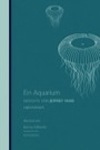Der US-amerikanische Autor und Übersetzer Jeffrey Yang stellte kürzlich in Göttingen seinen Gedichtband Ein Aquarium vor. Im Interview mit LitLog geht er auf lyrischen Tauchgang und erzählt von Aalen, Aristoteles, Atomtests und seiner Begeisterung für Meeresbiologie.
Von Jorid Engler
Jeffrey Yangs Gedichtband Ein Aquarium ist 2012 als zweisprachige Ausgabe im Berenberg Verlag erschienen. Seine Tiefseepoesie ist reich an Bildern, Klängen und Wissen und versammelt 55 alphabetisch sortierte Gedichte von A wie Abalone bis Z wie Zooxanthelle. Im Anschluss an eine vom Literarischen Zentrum veranstaltete Lesung in Göttingen erzählt der Dichter von fingerbeißenden Aalen und seiner Begeisterung für facettenreiche Lyrik.
Jorid Engler: Aristotle, Kant, Pound… the Aquarium refers to a lot of philosophers and thinkers. Who would you like to meet in reality?
Jeffrey Yang: Oh gosh, I mean a lot of these. Which one would I like to meet in reality? I’d like to meet Aristotle.
What would you ask him?
It depends: am I going back in time or is he going to come to our time? (laughs) If he came now, I’d ask him if he would have thought the world would be like this.
Not only philosophers influenced the Aquarium, there’s also Chinese mythology, different languages, historical elements and most obvious: various inhabitants of the ocean that the Aquarium includes. Reading it, I had the Aquarium in one hand an encyclopedia in the other hand.
Oh really? This question comes up a lot. I am working on a poem for not only its meaning, but its sound. Hopefully the feeling that comes through, the sound and some of the meaning can carry the poem and the reader is with the poems. Maybe later on going into a second reading to go deeper, cause I did a lot of research, too. But I hope you can read it on a lot of levels.
Might the connection of various fields of knowledge be seen as a metaphor for the ecosystem?
Yeah, I think you could see it like that. We often steer towards one area of study, but I think these days things are becoming more interconnected, so anthropology and other sciences, literature, music – I think they all relate in some way. And poetry is a place where you can actually thrive in that way, instead of just having to choose one thing.
Why did you choose the title »Aquarium«?
Bio
Jeffrey Yang wurde 1974 in Südkalifornien geboren und studierte Meeresbiologie, Biologie und Literaturästhetik. Yang lebt in Beacon, New York, wo er als Lektor und Übersetzer aus dem Chinesischen arbeitet. Unter anderem übertrug er Gedichte des Friedensnobelpreisträgers Liu Xiaobo ins Englische. Yang veröffentlichte die Gedichtbände An Aquarium und Vanishing Line.Buch-Info

Jeffrey Yang
Ein Aquarium
Gedichte
Aus dem Englischen von Beatrice Faßbender
Berenberg: Berlin 2012
96 Seiten, 19,00 €
Are we inside our outside the aquarium?
Ah… That’s up for you to decide. I think in a way we’re both inside and outside, but then, you know the idea was kind of taking the world at this kind in an aquarium. That’s why we’re not only looking in – we’re also a part of it. That’s kind of how I intended it.
Is it interesting for you to get to know what your readers see looking in your Aquarium?
Oh, yeah, I always enjoy learning what resonates. When I was doing a reading a person came to talk to me. He worked at Los Alamos, the nuclear testing scientific institution. He said that he put the very last poem of the book in their manual. That last poem, Zooxanthellae, is a lot about nuclear testing in the bikini islands. It was such a big tragedy. It’s an example for them of what not to do.
How do you think poems are effective to transmit criticism?
Well, I think it’s possible to incorporate it in a poem and have it function in a poem. Beyond that I really don’t know.
Is there a poem you like especially?
I don’t know I like all of them (laughs).
Eel
Eels are slimy creatures.
But never lie. If they sense
the slightest pretence, they’ll
bite off your finger. Carefully
study the hands of politicians.
Is there one poem you wrote at a specific experience?
Oh, that’s actually funny. Eel came definitely out of an experience. I used to work in an aquarium during college. One of the new people working there was feeding some of the eels and she put her hand in the water. And they actually bit her finger. She had to go to the hospital, get stitches, they didn’t bite it off though. But they bit her finger, she got very upset and scared. I remember that, but she wasn’t a politician.
The Berenberg Verlag was the first to publish the whole book in translation. Listening to the German version, do you get an alien impression of not recognizing them as ›yours‹?
I don’t understand German, I just hear the sound. You have all these very long words, but I enjoy it a lot. I was in Malaysia last year, too, and there’s someone translating into Malaysian and again hearing that was amazing… Wow – I love hearing the music!
So how’s German Aquarium-music compared to the english?
I think it sounds better actually! (laughs)


[…] Jorid Engler spricht mit Jeffrey Yang: Under the surface […]













